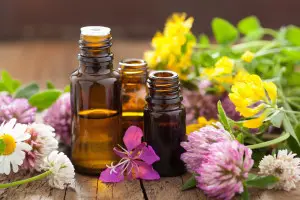Looking for the basics on homeopathy and essential oils? Both are natural remedies that are used for their many health and wellness benefits. That being said, there are distinct differences between homeopathy and aromatherapy. So to keep it simple, we’re going to provide a brief outline of what each method and ideology involves.
Homeopathy explained
Homeopathic medicine is a health practice and philosophy centered around the ideal that the body is able to heal itself. Founded in the late 1700s, homeopathy views symptoms as natural responses for the body to regain its health. In theory, a homeopathic dose of “medicine” boosts the body’s self-regulatory healing processes.
[amazon box=”B07BXW6FDS”]
A homeopathic physician uses pills or liquid solutions including small traces of an active ingredient (oftentimes a plant or some form of mineral) for treatment of the illness. These are referred to as diluted or “potentiated” homeopathic substances. Arguably, there are benefits to using homeopathic medicine, but there is certainly some obscurity in the efficacy of the practice:
- There is no scientific evidence to support its use, with some researchers claiming it is beyond the realm of general physics.
- Governments all over the world are beginning to deny insurance payments to subsidize homeopathic treatments.
- Homeopathy is broad form of treatment; therefore, you have to be careful about what you put in your body, as the substance may include traceable amounts of the original substance.
Now, we are far from claiming that homeopathy is medieval-aged quackery. Many people have found incredible results with pursuing this practice. We, personally, do not have a whole lot of experience with it. What we do have experience with is aromatherapy – and more specifically, essential oils.
Aromatherapy explained
 In short, essential oils are natural compounds of aroma that come from many different forms of plants, such as roots, flowers, seeds, and stems. These oils comprise a liquid that is typically distilled from these plant elements.
In short, essential oils are natural compounds of aroma that come from many different forms of plants, such as roots, flowers, seeds, and stems. These oils comprise a liquid that is typically distilled from these plant elements.
There are a number of misconceptions when it comes to the use of essential oils. No, they’re not simply some natural version of perfume. Sure, they offer rejuvenating scents that act as a form of fragrance. But they do a whole lot more. And they are not manufactured artificially with chemical additives and fillers – like the Dolce & Gabbana bottle you may have on your dresser.
[amazon box=”B005IHJ556″]
Furthermore, essential oils have countless uses, offering a wide range of therapeutic benefits. These can be applied topically or aromatically, and after being absorbed the benefits can be realized instantly. While we can’t claim that these aromatherapy products treat or cure any diseases (the FDA wouldn’t approve of us saying so), essential oil users all around the world have found success with them for addressing a range of issues:
- Stress and occasional anxious feelings (Lavender, frankincense, Relaxation blend)
- Minor back, neck, and wrist pain (Peppermint, lavender, Soothing Heat blend)
- Tension and minor head pains (Peppermint, Energize blend)
- Respiratory support and a healthy immune system (Frankincense, Peppermint)
- Relaxation and happy feelings (Lavender, frankincense, Euphoria blend)
- Enhanced focus, energy, and concentration (Peppermint, orange, Energize blend)
- And much, much more!
How to buy essential oils
Essential oils are generally sold in a variety of ways:
- Single oils: Individual oils such as lavender, lemon, and peppermint. Have many, many uses.
- Oil blends: Comprise multiple oils into a single bottle for easy application. Generally target a specific issue or benefit.
- Oil kits: These are aromatherapy kits that can include multiple single oils, multiple blends, and/or a mixture of both.
[amazon box=”B00SA5UWW8″]



I too LOVE my essential oils… I have found MANY different uses and I recommend and now distribute them as I truly believe in them!
But to call this article EO vs homeopathy isn’t very accurate… it doesn’t include much useful information about homeopathy and even though it states you don’t know enough about homeopathy it is still suggesting homeopathy as a lesser science. I have used homeopathy and it does help… slower and with a lot more trial and definitely requires a super professional to prescribe the right medicine and potency which I can’t do, but it has a lot of success.
I am now using oils a lot more as I feel I can use them and learn about them much quicker than homeopathy, for which I always required a specialist which was not easy to find.
I also find quicker results with oils and I just love the fact that there is an awesome community to find support with here in shanghai where I live… so we learn all the time together!
I am grateful for your article but wished you didn’t put homeopathy down as there are many respectable doctors who do a great job out there, and patients who can gratefully share their good results with dif alternative medicines… we shouldn’t we against each other but collaborate between the different forms of alternative methods to cure physical, emotional and spiritual ailments.
Thanks!
Maria
I took my hound daughter to see a homeopathic doctor who prescribed a small pellet in a bottle of water shaken. One sip twice a day. Change water bottle every few days. She had tics from ANXIETY for years. She was cured completely from the tics and hugely improved her ANXIETY in 2 weeks. Never had to repeat the treatment. I tried homeopathy for my other daughter who was constipated from infancy to age 5. Didn’t work. Different people require different treatment options. Homeopathy is very useful.